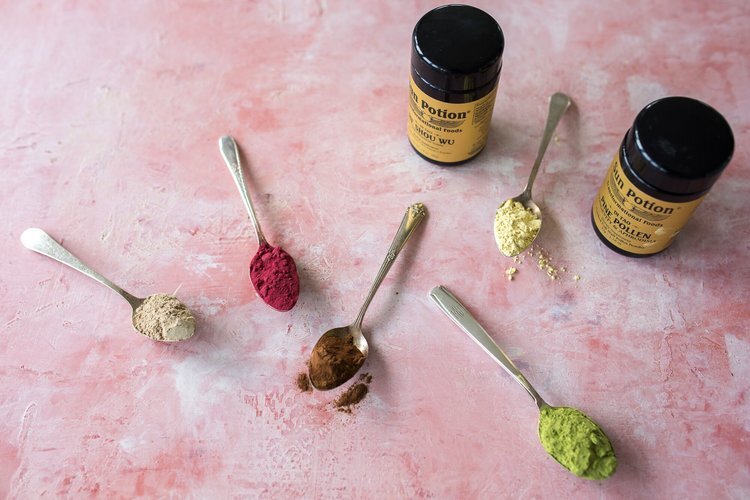Getting Started with Adaptogens
Because I have my ear to the ground on all things wellness related, I often hear about trends that at first may seem kind of "out there" or too good to be true, but often catch on and become media darlings.
Adaptogens totally fit that description.
Like many things that seem "new" in health and wellness, adaptogens have been used for thousands of years by ancient healing practices like Ayurveda and Traditional Chinese Medicine. In fact, you may have heard of things like maca (a hormone-balancing root from the Andes), reishi and chaga mushrooms (both fantastic for immune support and brain function) or ginseng (a fabulous energy booster) and not even known that they were adaptogens.
Adaptogens are plants like herbs and tubers, as well as fungi, that help nourish the body and nudge it back towards balance. They're like tonics for the system (in fact, they are sometimes referred to as "tonic herbs") and can help us cope with all the stuff that life throws at us on a daily basis. They live up to their name because of their unique ability to adapt themselves to fit what any given body needs at a particular time — kind like heat-seeking missiles, but in a good way. They can calm you down while also boosting your energy and do it gently to boot.
As busy women who are juggling multiple demands at any given time, this is essential! By supporting our adrenal glands (the place where our stress and sex hormones originate), adaptogens can help reduce stress and anxiety, lower inflammation, boost immunity, increase libido and support the aging process. They can also help us sleep better, think more clearly and generally just cope better — and who doesn't want that?! Personally, I've seen how they have impacted my health, my mood and my sleep in such a positive manner that I am now a total evangelizer.
So, what are the best adaptogens to begin incorporating? All options must fulfill three criteria to earn the official label: they must be generally safe and non-toxic (for just about everyone), help you handle stress (which can sometimes include multiple simultaneous stressors), and work to balance your hormones. The list of herbal remedies that fit these criteria is not that long, but can feel overwhelming at first — don't let that keep you from going forward!
Keep a curious mindset and do a little research according to your specific needs. You can start by experimenting with them one at a time or look for a blend that targets a specific need, like the Brain Dust blend from Moon Juice or the Mellow Mood blend from Lifehouse Tonics. The effects of adaptogens are best judged after a few weeks of use and can be subtle at first, so be patient and keep paying attention. Occasionally you will find that a particular adaptogen is too stimulating for you, and if that’s the case, you will know early on. This was true for me with maca and rhodiola, so now I find blends that don’t include those particular items.
Some favorite brands include Sun Potion, Four Sigmatic and Root and Bones. Look for sample sizes so you can experiment without making a larger financial commitment, because adaptogens can sometimes be pricey. When broken down to cost per day and or looked at as an investment in your health, they are 100 percent worth it.
There are several ways to add these superfoods into your daily wellness routine, including powdered supplements, teas and tinctures which are all readily found in natural pharmacies and at places like Whole Foods or other natural markets. There’s no real "best" way to consume them — it’s more a matter of personal taste. I like blending Ashwaganda (for reducing stress) and He Shou Wu (to support healthy aging) into my morning matcha latte and adding some Moringa (to lower inflammation) and a mushroom blend (for immunity and brain power) into my smoothies or chia pudding for breakfast. There's also some ashwaganda in a supplement that I take in the evening called Cortisol Manager which has really helped my insomnia. I add strips of Reishi into my slow cooker or Instant Pot when I make bone broth, sprinkle some chaga powder into chocolate recipes and add various adaptogen powders into everything from overnight oats and granola to baked goods, homemade almond milk and more. If cooking is not your thing, you might want to start with some Tulsi (Holy Basil) tea (good for anxiety) or a tincture for adrenal support like this one from Herb Pharm. There are so many ways to add these superfoods into your life!
It’s important to note that some adaptogens can interact with certain medications, so if you’re concerned, I recommend consulting with your doctor or pharmacist before using them. If you're pregnant or breastfeeding, you should also check with your provider. Be sure to get your adaptogens from a reliable source, since herbs and supplements are not regulated by the USDA or FDA.
xo
Lisa
*This piece was originally published by The Fold
